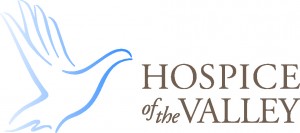Brad Leary is Director of Social Services and Counseling at Hospice of the Valley, a San Jose facility that, according to its website, “affirm[s] dignity and hope for those facing serious illness by providing comfort through compassionate palliative, hospice and grief care.” He spoke with us about the challenges in grieving during the holidays, as well as his own experiences in the hospice care field, and at Hospice of the Valley specifically.
Antal: Tell us about your role at Hospice of the Valley? What’s it like working there, what is your facility about?
Brad: Well, as Director of Social Services and Counseling I have two primary responsibilities: I deal with the chaplain services, and I look after the grief and counseling center. The last one takes up the bulk of my time, is the more pertinent. Grief counseling is an important element of Hospice of the Valley, and we offer these services not only to the bereaved, those who had a loved one pass in our care, but also to the community at large, on a sliding scale. We’re careful with this service. We actually divide up our support groups. There are senior partner/spousal loss groups, and there are young partner spousal loss groups — those who have been married for 50 years, their whole lives, and those who have been married for 10 years or less. This makes a big difference, how much of their life the survivor has spent with the bereaved, requires different kinds of sensitivity.
Antal: Sounds like a pretty sophisticated model.
Brad: Well, our grief support services are one of our distinguishing characteristics. That and our diversity. We have an expressive art group — rather than talking it through, this group deals strictly with art and artistic self-expression. It’s very effective for children especially. We have a suicide loss group for bereaved suicide survivors, where they will feel welcome, where they won’t be judged, in fact we just hosted one this morning.
Now, about our holiday workshops. We begin holding them in early November. Right after Halloween, you go into any department store and there’s Thanksgiving, Christmas decorations going up already. This can be a very stressful time for people, the holiday season especially, for those going into their first season after the loss of a loved one. It can be pretty challenging.
Antal: What did the holiday workshops look like?
Brad: We gathered 70 attendees this year and we broke them into groups, and we talk about what I like to call “the fears,” the fears of the holiday season. How can I get through this first year? How can I maintain with all these pressures, and even without my loved one now? Having a workshop provides an avenue to others who are thinking through the same stresses. There are 8-12 per group. People begin to talk about what they’re dreading: putting up the lights by themselves, carrying on traditions, buying gifts. Talking about our fears serves to de-mystify them, even when it’s with perfect strangers. It’s a little tool we have, and it can be surprisingly cleansing.
Brad: Well, they’re a bit of a departure. Sometimes people don’t realize that holidays suck, never thought about holidays being sad until after a friend dies, until they feel alone. It’s important to prepare for what lies ahead. If you’re grieving, or someone you know is, plan ahead for the holiday season: Christmas, Hannukah, whatever you celebrate. Have dialogue with your family and loved ones. It becomes pretty anxious, that first holiday season. We actually offer some guidance through this. Core persons for hospice can visit the person’s home environment, providing medical services, nurses or physicians, as well as practical and emotional support. We typically treat 150-160 patients a day. We’re the only hospice facility in Santa Clara County. We provide grief counseling for the survivors of those who passed in our care, we’re actually mandated to do that.
Antal: Hospice facilities are obliged by law to provide bereavement support to survivors?
Brad: Yes. That’s a commitment we have, that’s written into the bylaws.
Antal: Do you have any advice for those looking for the right hospice facility? What should they look for?
Brad: When your loved one is in hospital, or a hospital environment and has been terminally diagnosed, talk to social workers, discharge planners, the physician. It’s important to remember that you have a choice of hospice. Get your options. Have a hospice representative come to the hospital or home so you can ask about their specialties, their mission, what sets them apart from the others. A lot of people don’t take the time to do this, don’t learn their priorities, and they get stuck with a facility they aren’t happy with. I would also suggest doing a few Google searches of hospice programs, and look into their ancillary services, see what they offer. Some are for-profit, some are non-profit. This is an important distinction: for-profits obligation is to their stakeholders; non-profits are run by their board of directors, and their proceeds from hospice go back into their services. Look into individual housing and home care. Just make sure that you learn your options in advance, and decide what’s important to your loved one and their ailment.
Antal: Thank you so much for taking the time to speak with us. In closing, do you have any final words you would like to leave our readers with? How should a grieving person approach the holidays?
Brad: Just that it’s important during the holiday season to surround yourself with family and loved ones, to take the advice of social workers or receive visits from a chaplain or spiritual advisor for emotional or spiritual support. Most importantly, be gentle with yourself during this time. We all build up these expectations of ourselves, how we think we are supposed to act, how to cope. Try not to over-commit yourself, to parties, dinners, occasions, things like that. It’s okay to say “no,” if you feel like it. It’s also okay to ask for help.
Antal: Thanks again Brad. We wish you the best of luck.
Brad: Absolutely. Keep up the good work.
- Read more about the controversy surrounding for-profit vs. non-profit hospice care.
- One oncologist’s take on coping with terminal illness.

 Dealing with Death During the Holidays: an Interview with Brad Leary
Dealing with Death During the Holidays: an Interview with Brad Leary




 First the Wealth Gap, Now the U.S. Has a Growing Health Gap
First the Wealth Gap, Now the U.S. Has a Growing Health Gap

 Our Annual Seven Holiday Gifts for Someone Who Is Grieving, 2024 Edition
Our Annual Seven Holiday Gifts for Someone Who Is Grieving, 2024 Edition














